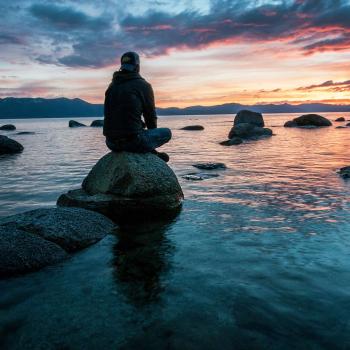How busy is your life? Do you ever find the time to stop and smell the roses, or at least your morning cup of coffee? Or is your life a constant whir of activity, moving from one work responsibility or life chore or social interaction to the next?
Whether you work from home or in a bustling restaurant, live alone or with a large extended family, we all need to find moments of solitude. These are periods where we unplug from the concerns of our jobs and life so we can catch our breath and recharge our batteries.
In Stillness is The Key, life philosopher Ryan Holiday tells us that “solitude is not just for hermits, but for healthy, functioning people.” We all need occasional alone time to collect our thoughts and recenter ourselves. Holiday describes the need like this:
Sometimes you have to disconnect in order to better connect with yourself and with the people you serve and love.
We actually may be hard-wired for solitude.
While too much isolation can have a negative impact on our physical and mental health, the flip side is we also need what some call “private time.” Writing on the website Verywell Mind, psychologist Kendra Cherry tells us it’s important for us to find “the time and freedom to truly explore your own passions without interference.” She explains:
“It can be a way to try new things, research topics that fascinate you, acquire knowledge, and even practice new methods of self-expression. Instead of worrying about the needs, interests, and opinions that others may have, alone time lets you focus on yourself.”
The need to occasionally be alone dates to the earliest days of humankind. While we’re essentially social creatures, we also need to balance our communal interactions with time spent in our own company. David A. Cooper, writing in Silence, Simplicity and Solitude, says that:
The busy life we lead, our calendar filled with business obligations, social activities, or family interaction several days a week, is a relatively new phenomenon for humans. Missing for most people in today’s world is the weekly period of solitude and reflection that was an integral part of life for thousands of years.
Ryan Holiday points out that Bill Gates, the Microsoft founder and philanthropist, has for years taken a “think week” twice a year. He spends seven days alone in an undisclosed cabin in a forest, without business associates, family members or a smartphone at his side. By “physically removing himself from regular interruptions, he can really sit down and think. Gates emerges recharged and refocused.”
You can find solitude even in a busy city.
While we all might like to have the opportunity to escape to a cabin in the woods or a retreat facility, most of us don’t have the time or wherewithal to pull this off. Cooper reminds us that “a good solid retreat can be accomplished in our own mind,” and all we really need are two things: solitude and silence.
In No Attachments, No Aversions, the American spiritual master Lester Levenson (more on him in a few weeks), tells the story of how he found solitude while living in the middle of Manhattan. In his words:
I was totally cut off from the world, right in New York City. I’d only go out to buy food between 2 and 5 a.m. when the city streets were emptiest. Stores were open all night in Manhattan. I saw no one except the grocer.
For Levenson, the purpose of his isolation was to clear his head which helped him come to several vital realizations. He advises us to be doggedly determined to “dive deeply into the inner direction of seeking your real Self—so much so, that you keep your direction and attention constantly inward.”
These retreats don’t happen by accident. We need to schedule them.
That means setting aside time for a 30-minute or one hour mini-retreat, where we can contemplate, meditate, focus on the breath, or simply just be. This may involve putting a do-not-disturb sign on your bedroom door or carving out time by waking up at dawn or staying up late, after the rest of the family has retired for the evening. To successfully engage in moments of solitude, Kendra Cherry advises us to:
- Pick a time. Figure out when you’d like to spend some time alone. Plan that time into your schedule and make sure other people know you’re not available during that time.
- Turn off social media. Work on eliminating distractions. Your focus should be on your own thoughts and interests, not what other people are doing.
- Plan something. If you’re not comfortable spending time alone, plan out what you want to do. This might involve exploring a favorite hobby or reading a book.
- Take a walk. Spending a little time outdoors by yourself can have a restorative effect and a beneficial impact on your well-being.
When we find the time to stop, disconnect and recharge, it has a way of rejuvenating and refocusing us. In the words of Cooper, these periods of solitude or mini-retreats enable us to “develop the light within us to bring into the world and yet not get caught up in the world.” Or as Ryan Holiday puts it:
“Each of us need to put ourselves, physically, in the position to do that kind of deep work….even if only for a few stolen hours—where we can think and have quiet and solitude. We have responsibilities. But they will be better for our temporary disappearance. We will carry back with us the stillness from our solitude in the form of patience, understanding, gratitude and insight.”














